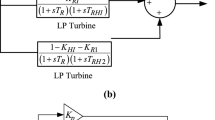Abstract
Modeling, simulation, and performance analysis of an isolated hybrid power system (IHPS) consisting of solar thermal power plant, diesel engine generator (DEG), and wind turbine generator (WTG) are done in this paper. Performance of the studied IHPS model has been studied under two different input conditions, viz. (a) step change in load disturbance and wind perturbation and (b) random change in load disturbance and solar and wind perturbation. For better frequency stabilization of the system, proportional–integral–derivative (PID), integral–tilt–derivative (I-TD), and tilt–integral–derivative (TID) controllers are used (one at a time) for controlling governor of the DEG and pitch of the WTG. To obtain better performance for the studied IHPS model, the controller gains are tuned by using quasi-oppositional-based whale optimization algorithm. A comparative dynamic response of frequency deviation profile has been carried out under individual presence of PID, I-TD, and TID controllers. The transient responses of the system pertaining to step and random changes in the load disturbance and solar and wind perturbation are plotted and analyzed. It is revealed from this work that the performance of the proposed TID controller is better than the other controllers for this specific application.












Similar content being viewed by others
References
Aidoo IK, Sharma P, Hoff B (2016) Optimal controllers designs for automatic reactive power control in an isolated wind-diesel hybrid power system. Electr Power Energy Syst 81:387–404
Amin H, Masoud AG (2010) Control of hybrid fuel cell/energy storage distributed generation system against voltage sag. Int J Electr Power Energy Syst 32(5):488–497
Arya Y (2017) AGC of restructured multi-area multi-source hydrothermal power systems incorporating energy storage units via optimal fractional-order fuzzy PID controller. Neural Comput Appl. 31:1–22
Behera S, Sahoo CP, Subudhi B, Pati BB (2016) Reactive power control of isolated wind-diesel hybrid power system using grey wolf optimization technique. Procedia Comput Sci 92:345–354
Bhatti TS, Al-Ademi AAF, Bansal NK (1997) Load frequency control of isolated wind diesel hybrid power systems. Energy Convers Manag 38(9):829–837
Das DC, Roy AK, Sinha N (2012) GA based frequency controller for solar thermal-diesel-wind hybrid energy generation/energy storage system. Electr Power Energy Syst 43(1):262–279
Ganguly S, Mahto T, Mukherjee V (2017) Integrated frequency and power control of an isolated hybrid power system considering scaling factor based fuzzy controller. Swarm Evol Comput 32:184–201
Ganguly S, Shiva CK, Mukherjee V (2018) Frequency stabilization of isolated and grid connected hybrid power system models. J Energy Storage 19:145–159
Global Market Outlook for Solar Power/2017–2021 (2017) Renewable energy cooperation programme (RECP)
Global Wind Report (2017) Global wind energy council
Guangqian DU, Bekhrad K, Azarikhah P, Maleki A (2018) A hybrid algorithm based optimization on modeling of grid independent biodiesel-based hybrid solar/wind systems. Renew Energy 122:551–560
Kodama N, Matsuzaka T, Inomata N (2001) The power variation control off a wind generator by using probabilistic optimal control. Trans Inst Electr Jpn 121(1):22–30
Lalor G, Mullane A (2005) Frequency control and wind turbine technologies. IEEE Trans Power Syst 20(4):1905–1913
Li Y, Choi SS, Vilathgamuwa DM (2018) Primary frequency control scheme for fixed speed dish-stirling solar-thermal power plant. IEEE Trans Power Syst 33(2):2184–2194
Lurie BJ (1994) Three-parameter tunable tilt-integral derivative (TID) controller. US Patent US5371670
Mirjalili S, Lewis A (2016) The whale optimization algorithm. Adv Eng Softw 95:51–67
Rahnamayan S, Tizhoosh HR, Salama M (2007) Quasi-oppositional differential evolution in evolutionary computation. In: IEEE congress, pp 2229–2236
Ramli MAM, Bouchekara HREH, Alghamdi AS (2018) Optimal sizing of PV/wind/diesel hybrid micro-grid system using multi-objective self-adaptive differential evolution algorithm. Renew Energy. https://doi.org/10.1016/j.renene.2018.01.058
Sahu RK, Panda S, Padhan S (2014) Optimal gravitational search algorithm for automatic generation control of interconnected power system. Ain Shams Eng J 5(3):721–733
Sain D, Swain SK, Mishra SK (2016) TID and I-TD controller design for magnetic levitation system using genetic algorithm. Perspect Sci 8:370–373
Sedaghat B, Jalilvand A, Noroozian R (2012) Design of a multilevel control strategy for integration of stand-alone wind/diesel system. Int J Electr Power Energy Syst 35(1):123–137
Shankar G, Mukherjee V (2016) Load frequency control of an autonomous hybrid power system by quasi-oppositional harmony search algorithm. Electr Power Energy Syst 78:715–734
Tizhoosh HR (2005) Opposition-based learning: a new scheme for machine intelligence. In: International conference on computational intelligence for modelling, control and automation, no. 1, pp 695–701
Topno PN, Chanan S (2016) Automatic generation control using optimally tuned tilt integral derivative controller. In: IEEE CMI, pp 206–210
Xiong P, Jirutitijaroen P, Singh C (2017) A distributionally robust optimization model for unit commitment considering uncertain wind power generation. IEEE Trans Power Syst 32(1):39–49
Zhang Y, Melin MA, Djouadi MS, Olama MM, Tomsovic K (2018) Provision for guaranteed inertial response in diesel-wind systems via model reference control. IEEE Trans Power Syst 33(6):6557–6568
Author information
Authors and Affiliations
Corresponding author
Appendix
Appendix
Nominal system parameters of the studied IHPS model are presented in Table 13.
Rights and permissions
About this article
Cite this article
Ganguly, S., Mukherjee, V. Frequency Stabilization of Isolated Hybrid Power System by a Novel Quasi-Oppositional Whale Optimization Algorithm. Iran J Sci Technol Trans Electr Eng 44, 1467–1486 (2020). https://doi.org/10.1007/s40998-020-00341-5
Received:
Accepted:
Published:
Issue Date:
DOI: https://doi.org/10.1007/s40998-020-00341-5




